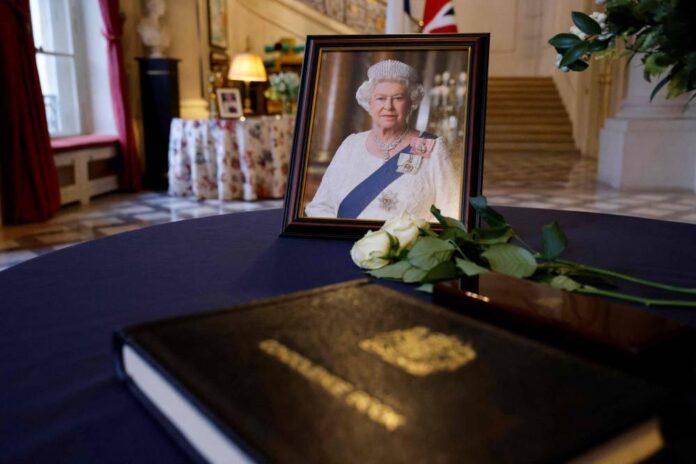A condolence book and a portrait of Queen Elizabeth II are seen at the British Embassy in Paris on September 9, 2022, a day after the Queen died at the age of 96. — AFP pic
Follow us on Instagram, subscribe to our Telegram channel and browser alerts for the latest news you need to know.
TEHRAN, Sept 10 — Tehran has avoided official comment on the death of Queen Elizabeth II, but some Iranians expressed outright hostility, accusing Britain of having supported the late shah’s regime.
Unlike many countries with wall-to-wall coverage, state television in the Islamic republic reported the bare minimum on the death Thursday of the woman who had been the world’s longest reigning monarch, with just a brief announcement along with archive footage and photographs.
Haniyeh, a student, told AFP she had learned of the queen’s death from social media.
“I saw the news of her death on Instagram. I felt nothing, and frankly I couldn’t care less,” she said.
Elizabeth II was crowned in 1953 aged just 27, and died in Scotland on Thursday at the age of 96.
Broadcasters around the world interrupted normal programming to announce her death, but young north Tehran market trader Faraz said he hadn’t even heard of her.
“I don’t have a television at home and I’ve no interest in politics. I didn’t know her,” he said.
Many Iranians are interested in politics, both domestic and international. But most remain indifferent to the world’s royal families ever since the Islamic revolution of 1979 toppled the country’s own monarchy.
Faezeh, a 26-year-old nurse, told AFP: “I knew nothing about her, and her death means nothing to me.”
Queen Elizabeth visited Iran in 1961, staying in the magnificent Golestan Palace in Tehran. She also visited Isfahan, Shiraz and Persepolis, accompanied by Farah Pahlavi, the then empress.
Elizabeth’s son Charles — now Britain’s King Charles III — visited Iran on a humanitarian mission following the devastating 2003 earthquake in Bam in the southeast that cost tens of thousands of lives.
A complex history
UK-Iran relations have always been complex.
British and Soviet forces invaded Iran in 1941 to secure British oilfields at Abadan.
During the occupation, the pro-Axis Shah Reza Pahlavi was forced into exile and replaced by his young son Mohammad Reza Pahlavi.
Britain also supported Pahlavi’s army during the 1946 crushing of the Kurdish republic of Mahabad.
But what Iranians remember most is the overthrow in August 1953 by the British and American secret services of prime minister Mohammad Mossadegh who had nationalised the oil industry.
“Queen Elizabeth II was one of those who orchestrated the coup that overthrew Dr Mossadegh’s government” to restore the shah, wrote Twitter user Helma.
Another Twitter user, Majid, was more forthright.
“Don’t make a saint of the queen of England,” he wrote.
“Among her crimes were helping Iraq’s Baathist regime against Iran (in the 1980-1988 war), the coup against Mossadegh, the killing of Princess Diana, helping the US attack Afghanistan and Iraq in 2001 and 2003, and murdering the people of Northern Ireland.”
However, a passage in the recent book The Secret Royals by Richard J. Aldrich and Rory Cormac gives a rather different view.
The authors write that the late queen “considered the shah a crushing bore and hated his company as he only talked of administrative matters”.
But they also say that in 1979 after the Islamic revolution she was “angry about letting the shah down” when the government in London baulked at suggestions that he be offered asylum in Britain.
However, Britain’s royals were remembered by supporters of Mohammad Khatami, Iran’s fifth president between 1997 and 2005.
The “@Khatamy” Instagram account, with nearly a million followers, shared photographs of the queen, as well as pictures of her son Charles with Khatami.
Khatami, considered a moderate in Iranian politics, had said the English should be appreciated for “having established democracy”. — AFP


